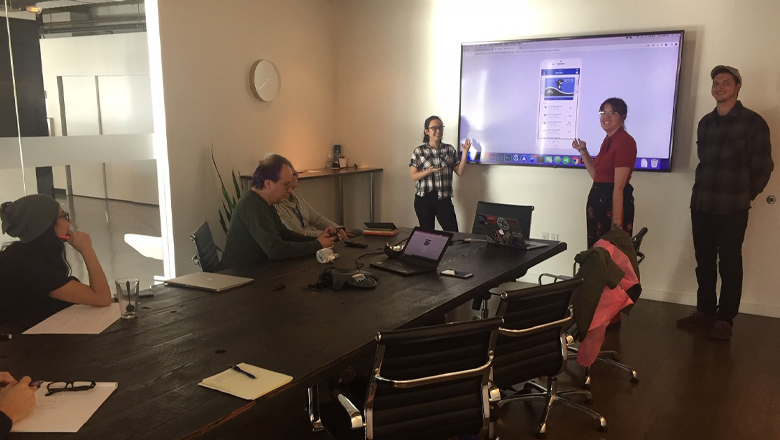
EVENTS Team presenting research and design choices to the UI/UX firm designing the next gen ORCA website and mobile app.
Sponsored by Challenge Seattle, King County Metro and Sound Transit, the University of Washington Mobility Innovation Center (MIC) launched four capstone projects focused on real world solutions for issues concerning transportation. These projects tackle specific transportation challenges that help improve access to transit via mobile phone.
Team 1: Next Gen Transit Fare Payment
Two of the teams were recruited directly from the College of Engineering Human Centered Design & Engineering Program (HCDE), and they won 1st place and runner up in the People’s Choice Awards respectively. The first team focused on EVENTS, with a goal of reducing cash fare payments for infrequent riders and increasing the adoption of ORCA. The team came up with a payment platform concept. With this app, users can instantaneously update balance, see past trips, and manage multiple accounts. Watch the project pitch video.
Team 2: “Go Seattle” Mobile App for Tourists
The second team focused on TOURISTS. They came up with an all-inclusive public transit mobile ticketing app, Go Seattle, with intuitive UX design for purchase and navigation. This app is perfect for tourists to decide on a route, buy tickets, and discover popular destinations. King County Metro will use both HCDE teams’ UX design concepts to communicate with an outside design firm that is supporting the development of Next Gen ORCA. Based on recommendations from the HCDE teams, King County Metro plans to change the app’s menu structure for the mobile ticket to improve usability and improve customer experience. Watch the project pitch video.
Team 3: Seattle Area Incident Avoidance
A third interdisciplinary team was assembled in partnership with the College of Engineering Industry Sponsored Capstone Program. This capstone project focused on MODESHIFT by providing a solution for Seattle Area Incident Avoidance. With this solution, users would be able to see live updates and closures caused by major incidents on the roadway, visually explore affected areas, accurately plan routes to avoid traffic congestion, and get guidance on nearby parking options and prioritized public transit routes.
This team was led by Prof. Don Mackenzie in the Civil Engineering department and involved students from the Department of Civil and Environmental Engineering (CEE), Paul G. Allen School of Computer Science & Engineering (CSE), HCDE and, for the first time ever, also involved a student from the Communications department (Arts & Sciences) across campus.
Washington State Department of Transportation (WSDOT), which participated in a mentorship role, has taken MODESHIFT recommendations to a multi-agency workgroup that is focused on communicating transportation options to the public in the wake of a major incident. Much of what students developed for WSDOT depends upon successful buildout of the Virtual Coordination Center (VCC). In that context, the students have provided a model of something that could be successful and incorporated by WSDOT.
Team 4: Equitable Transit
While the above three projects were accomplished by undergraduate students, the fourth team was composed of Master of Science and Information Management students from the School of Information who were joined by an Master of Public Administration student and supporting faculty from the Evans School of Public Policy. This multidisciplinary team won the Capstone project team competition for the best project that demonstrated diversity and inclusion.
This team focused on EQUITY by creating a Mobile Ticket App that enhance equitable access to transit, especially among low income riders, unbanked riders, and riders with limited English proficiency. They created and administered a survey, which is translated into 13 languages and consists of questions ranging from asking about income to understanding how participants used their phones. The team then analyzed the results and built an interactive dashboard for agencies to compare and analyze the data in three areas: demographics, technology, and payment. King County Metro will use the results of the survey created and administered by iSchool + Evans and will build on this and connect with other public organizations via the results of this project. Based on recommendations from the EQUITY team, King County Metro has developed a Spanish language version of the mobile ticketing app and is engaging the app vendor to improve payment options for customers without bankcards or bank accounts. Watch the project pitch video.